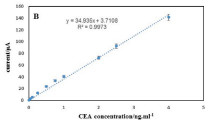ARG10188
anti-CD66e / CEA antibody [CEA-Y1]
anti-CD66e / CEA antibody [CEA-Y1] for ELISA,Western blot and Human
Cancer antibody; Developmental Biology antibody; Controls and Markers antibody; Microbiology and Infectious Disease antibody
Overview
| Product Description | Mouse Monoclonal antibody [CEA-Y1] recognizes CD66e / CEA |
|---|---|
| Tested Reactivity | Hu |
| Tested Application | ELISA, WB |
| Specificity | Cross-reactivity with other human protein was not found. |
| Host | Mouse |
| Clonality | Monoclonal |
| Clone | CEA-Y1 |
| Isotype | IgG1, kappa |
| Target Name | CD66e / CEA |
| Antigen Species | Human |
| Immunogen | Human carcinoembryonic antigen (CEA) |
| Conjugation | Un-conjugated |
| Alternate Names | Carcinoembryonic antigen-related cell adhesion molecule 5; CEA; CD66e; CD antigen CD66e; Carcinoembryonic antigen; Meconium antigen 100 |
Application Instructions
| Application Note | ELISA: this antibody can be used as capture antibody in sandwich ELISA for quantitative detection of CEA Western Blot: 25 ng/lane of antigen can be detected when the antibody was used at 100 ng/ml. * The dilutions indicate recommended starting dilutions and the optimal dilutions or concentrations should be determined by the scientist. |
|---|
Properties
| Form | Liquid |
|---|---|
| Purification | Protein G affinity purified |
| Buffer | 0.01M PBS (pH 7.0) |
| Storage Instruction | For continuous use, store undiluted antibody at 2-8°C for up to a week. For long-term storage, aliquot and store at -20°C or below. Storage in frost free freezers is not recommended. Avoid repeated freeze/thaw cycles. Suggest spin the vial prior to opening. The antibody solution should be gently mixed before use. |
| Note | For laboratory research only, not for drug, diagnostic or other use. |
Bioinformation
| Database Links |
Swiss-port # P06731 Human Carcinoembryonic antigen-related cell adhesion molecule 5 |
|---|---|
| Gene Symbol | CEACAM5 |
| Gene Full Name | carcinoembryonic antigen-related cell adhesion molecule 5 |
| Background | Carcinoembryonic Antigen (CEA) is a 180-200 KD glycoprotein expressed at high level in the epithelial cells of the embryonic colon. The expression is stopped after birth. CEA serum content is low in normal population and only slightly elevated in heavy smokers. Increased serum CEA level was found to be associated with colorectal carcinoma, gastric carcinoma, pancreatic carcinoma, lung carcinoma, and breast carcinoma. However elevated CEA level does not necessarily indicate neoplastic conditions. CEA level is useful for monitoring tumour recurrence after surgical resection of carcinoma. |
| Function | Cell surface glycoprotein that plays a role in cell adhesion and in intracellular signaling. Receptor for E.coli Dr adhesins. [UniProt] |
| Highlight | Related Antibody Duos and Panels: ARG30066 Carcinoembryonic Antigen ELISA Antibody Duo Related products: CD66e antibodies; CD66e ELISA Kits; CD66e Duos / Panels; Anti-Mouse IgG secondary antibodies; |
| Research Area | Cancer antibody; Developmental Biology antibody; Controls and Markers antibody; Microbiology and Infectious Disease antibody |
| Calculated MW | 77 kDa |
| PTM | Complex immunoreactive glycoprotein with a MW of 180 kDa comprising 60% carbohydrate. |
Images (1) Click the Picture to Zoom In
-
ARG10188 anti-CD66e / CEA antibody [CEA-Y1] ELISA image
ELISA: Antigen stained with ARG10188 anti-CD66e / CEA antibody [CEA-Y1].
From Ali Shamsazar et al et al. Microchemical Journal (2024), doi: org/10.1016/j.microc.2023.109643, Fig. 6.A.
Specific References








